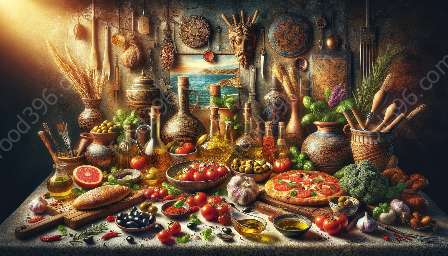Mediterranean cuisine holds a rich history that reflects a diverse tapestry of influences dating back thousands of years. To truly understand the origins of this culinary tradition, it's essential to delve into the ancient cultures, trade routes, and agricultural practices that have shaped the unique flavors and dishes we know today.
Ancient Mediterranean Diet: Foundation of Flavor
The roots of Mediterranean cuisine can be traced back to the ancient civilizations that flourished along the shores of the Mediterranean Sea. The dietary patterns of these societies, including the ancient Greeks, Romans, and Egyptians, laid the foundation for the distinctive ingredients and cooking techniques that define this culinary tradition.
Central to the ancient Mediterranean diet were staples such as olives, grapes, wheat, and barley, which provided the essential ingredients for olive oil, wine, bread, and porridge. These agricultural practices not only sustained the populations of ancient Mediterranean civilizations but also influenced the development of their culinary identity.
Culinary Crossroads: Influence of Trade and Migration
The Mediterranean region has long been a crossroads of trade and migration, with diverse peoples and cultures converging to exchange goods, ideas, and culinary practices. The interplay of Phoenician, Carthaginian, Greek, and Persian influences, among others, contributed to the rich tapestry of flavors and ingredients that characterize Mediterranean cuisine.
A key factor in the spread of culinary influences was the extensive network of trade routes that connected the Mediterranean with other regions, enabling the exchange of spices, grains, and culinary techniques. Trade with the Middle East, North Africa, and Asia brought ingredients such as saffron, cinnamon, and rice to the Mediterranean, diversifying the local culinary landscape.
Arab Legacy: Culinary Innovation and Refinement
The Arab conquests of the Mediterranean region during the Middle Ages left an indelible mark on the culinary traditions of the area. Arab culinary practices, including the use of spices, fruits, and nuts, as well as intricate cooking methods, greatly influenced the evolution of Mediterranean cuisine.
Moreover, the Arabs introduced new agricultural techniques, such as irrigation and crop cultivation, which enhanced the production of key ingredients like citrus fruits, almonds, and sugarcane. These innovations not only enriched the flavors of Mediterranean dishes but also broadened the culinary repertoire of the region.
Renaissance of Flavor: Influence of New World Ingredients
The Age of Exploration brought about significant changes in Mediterranean cuisine with the introduction of New World ingredients, such as tomatoes, peppers, corn, and potatoes. These novel additions transformed traditional Mediterranean recipes, leading to the creation of iconic dishes such as gazpacho, ratatouille, and patatas bravas.
The integration of New World ingredients not only expanded the flavor palette of Mediterranean cuisine but also exemplified the adaptability and creativity of Mediterranean chefs and cooks in embracing novel culinary elements.
Culinary Continuity: Enduring Traditions and Celebrations
Despite the diverse influences that have shaped Mediterranean cuisine over the centuries, certain culinary traditions and rituals have remained integral to the region's gastronomic identity. From the communal feasting of Greek symposia to the lively festivals of Spain and Italy, the culinary heritage of the Mediterranean is deeply intertwined with social customs and convivial gatherings.
Furthermore, the emphasis on fresh, seasonal ingredients, as well as the communal sharing of meals, reflects the enduring values of simplicity, authenticity, and conviviality that characterize Mediterranean cooking.
Celebrating Mediterranean Cuisine: A Tapestry of Flavors and History
The origins of Mediterranean cuisine are a testament to the region's rich history and cultural diversity. As a culinary tradition shaped by ancient civilizations, maritime trade, diverse migrations, and global exploration, Mediterranean cuisine embodies a vibrant tapestry of flavors and ingredients that continue to captivate and inspire food enthusiasts around the world.
From the sun-drenched hills of Greece to the bustling souks of Morocco, the roots of Mediterranean cuisine endure in the timeless simplicity of olive oil, the tangy sweetness of citrus fruits, and the aromatic allure of herbs and spices. By understanding the origins of Mediterranean cuisine, we can truly savor the depth of flavors and history that converge in each sumptuous bite.

